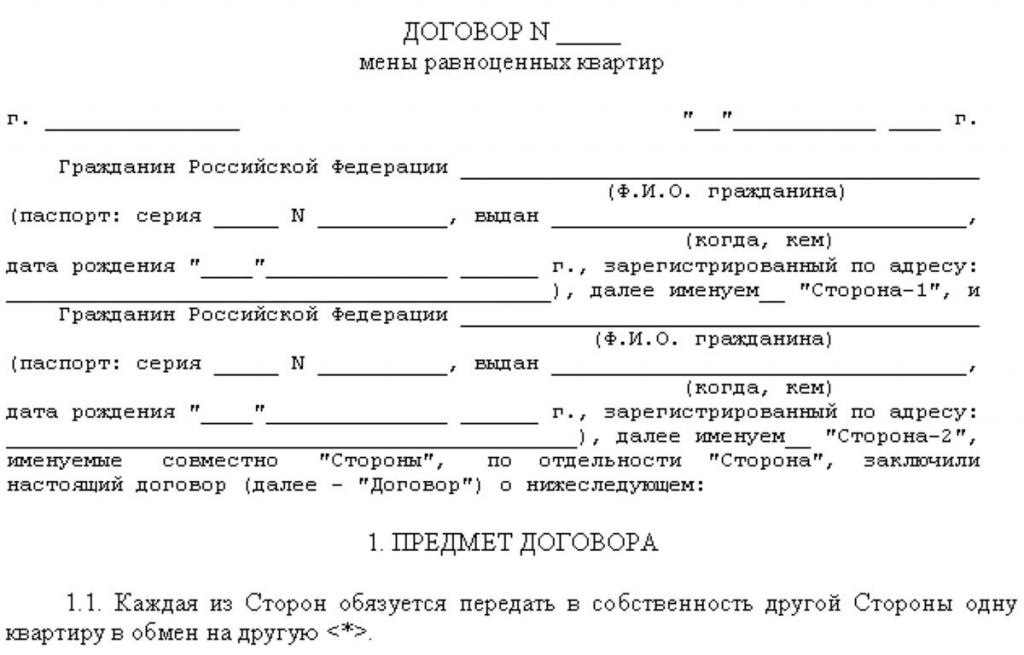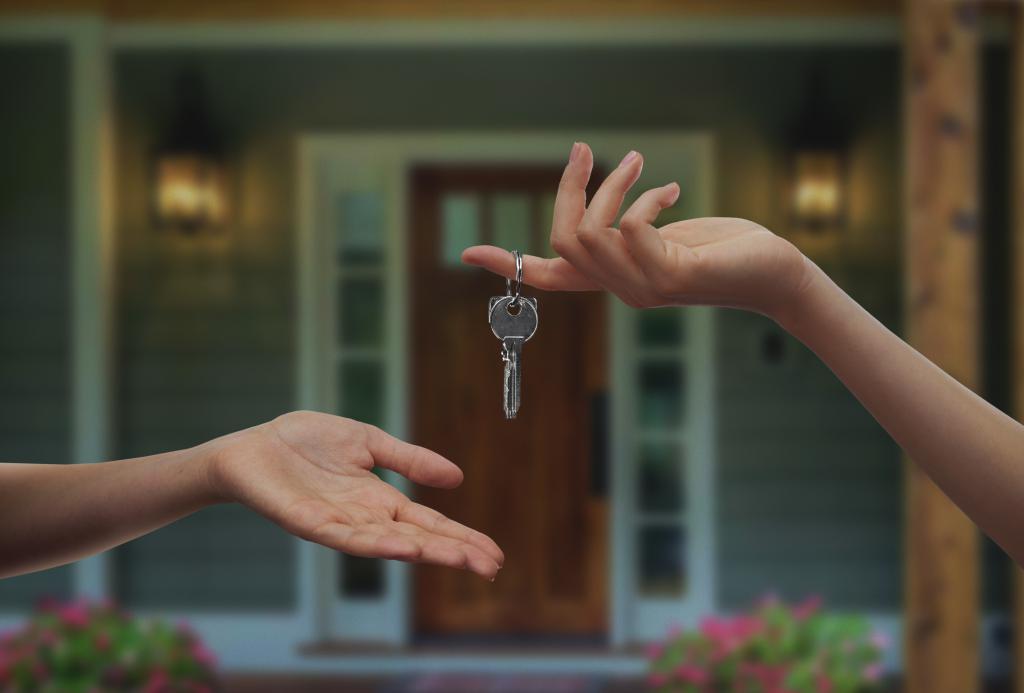Relatives often make a decision about the need for an exchange of real estate. There can be many different reasons for this. All the features of this process are solved by compiling official documents. A related exchange of an apartment for an apartment can be carried out on the basis of an exchange or sale agreement. It is important to understand the rules for implementing the procedure, as well as the tax consequences.
What exchange options are used
When exchanging real estate, the following options may apply:
- The apartment is exchanged for another. If the area of the two objects is different, then a surcharge may be required.
- Exchange of shares.
- The room changes to an apartment.
The specific option depends on which goals are achieved through the implementation of this exchange.

Reasons for sharing
A related exchange of apartments for apartments may be required to achieve different goals. These include:
- Territorial preferences (families want to change the area of residence).
- One family wants to move to the city, while another prefers solitude in the village or town.
- The need to receive a certain amount of money by one participant in the transaction, if the use of surcharges is supposed based on the results of the exchange.
- Family moving to another city, which leads to intercity exchange.
- Settlement of disagreements regarding cohabitation of citizens. Often such a procedure is carried out forcibly, therefore, a preliminary trial is conducted.
The specific method of exchange depends on the available reasons, and is also taken into account whether the property is privatized or municipal. When exchanging apartments between relatives, it is required to register the right of each participant to the received object.
If the property is municipal, then the exchange procedure is complicated, since its implementation will have to obtain the consent of local authorities.

How is a deal made?
When implementing a family exchange of an apartment for an apartment, it should be decided which methods will perform this procedure. They can be like this:
- Drawing up a contract of exchange. Under such conditions, both participants are both sellers and buyers of real estate. The transaction may be equivalent or surcharge. An exchange of an apartment for an apartment between cities can be performed. Relatives have the right to change the city of residence after the procedure. If an additional payment is required, then its size is determined individually, for which the area and other parameters of the existing property are taken into account. It is allowed not to use the help of a notary, but the documentation will certainly be registered with the Rosreestr. The amount of the contract is taxed at 13%.
- Signing a contract of sale. This method is considered less costly in taxes. A related exchange of an apartment for an apartment with the preparation of the DCT implies the existence of a contract on each side. To make the transaction legally clean and reliable, it is recommended to notarize it. Next, the registration of objects for new owners in Rosreestr. Each party pays 13% of its contract, but a deduction can be used due to the purchase of new housing, so the need to completely pay the tax is almost always eliminated if citizens have not used this privilege before.
- Drawing up a gift. This option is considered the most economical and convenient.It is applied only on the condition that there really is a good relationship between relatives, so they trust each other. Therefore, non-resident apartment exchange is carried out on the basis of donations issued by each party. If the exchange is not equal, then it will not be possible to prescribe a clause in the donation agreement related to the surcharge. This issue is resolved through verbal agreement, so there really should be no disagreement between relatives.
The choice of a specific method depends on the desires of the direct participants in the transaction. The most commonly performed procedure is based on a barter agreement.

Stages of the kinship exchange of an apartment for an apartment
The process is divided into successive stages:
- Initially, relatives verbally agree on the transaction, for which an inspection of the premises is carried out, the most significant conditions are discussed.
- The parties make a final decision regarding the need for exchange.
- The living quarters are being prepared for exchange, for which all registered people are being written out, utility bills are paid, and a technical plan and a passport for housing are being prepared.
- All owners draw up a written consent to conduct the process.
- Experienced appraisers are invited to determine the value of each property, which will decide if an additional payment is required.
- Before signing the documents, you should agree on a surcharge.
- An exchange agreement is being prepared. The process can be carried out independently or with the help of a invited notary. You can also contact specialized companies involved in the preparation of various documents.
- Changes are being made to the Rosreestr. The process can take from 3 to 10 days, after which each property passes to the new owner.
Exchange of an apartment for an apartment between cities or in one region does not take much time. Since the process is carried out between people with kinship, it is not even necessary to spend money on notary fees, so all documents are compiled by citizens on their own.
What documents are needed
Before direct conclusion of the transaction, you should carefully understand how to arrange a family exchange of apartments. The process involves the preparation of the necessary documentation, which includes paper:
- Extracts from the USRN to apartments in which the one who acts as the owner of the property is registered.
- Consent of all owners to the transaction. It must be certified by a notary.
- Technical papers on the subject. These include a technical plan and a passport. With the help of these documents, relatives can verify that there is no illegal redevelopment in the apartment.
- Help from the BTI.
- Copies of house books, including information about who is registered in the home.
- Receipt of payment of state duty for registration of real estate for a new owner.
- An immediate exchange agreement containing important and essential conditions, since if there is no information about the parties, surcharge and exchangeable apartments, such a document is easily recognized by the court as invalid.
If you choose a method involving the preparation of donations, then an immediate donation agreement is additionally formed, and documents are prepared that serve as confirmation that there is a relationship between the parties to the transaction. This will allow you not to pay tax.

The nuances of the exchange of municipal real estate
Many citizens still live in municipal real estate. Even under such conditions, the exchange of a one-room apartment to a one-room apartment is allowed. The features of this process include:
- Exchange Rules (contained in Article 72 of the LC).
- The exchange agreement is signed in triplicate, as one document must be transmitted to the local administration.
- Each participant is obliged to transfer to the municipality the necessary package of documents for the transaction.
- All registered persons must agree to the exchange.
- Additional payments are not allowed, as the property does not belong to the direct residents. This rule is also valid if one changeable living space is much larger than another.
To complete the process, the consent of the municipality acting as the owner of the property is required.
When a transaction is declined by the local administration
The procedure for the exchange of municipal housing is carried out only with the consent of the process from the municipality. Failure may be due to the following reasons:
- The court is considering a case on the basis of which the social loan agreement with one of the participants in the transaction is terminated.
- The premises indicated in the agreement are unsuitable for living.
- In the house where the apartment is located, a major overhaul is planned in the near future.
- The building is subject to demolition.
- The right of residents to use specific real estate is disputed.
- One of the participants has a chronic disease.
Under such conditions, the exchange will be refused.

Duration of the exchange process
Most often there is an exchange of a privatized apartment for a privatized one. This does not require the permission of state organizations or third parties. The process involves taking into account the following features:
- The duration of the procedure depends on whether a specialist involved in the preparation of the contract and other documents is invited to complete the process, since with his participation all actions can be completed more quickly.
- Registration in Rosreestr does not take more than 7 days. If you address this issue at the MFC, the period will increase to 9 days.
Typically, the process takes about a month with the independent implementation of all stages.
Exchange cost
To register property for a new owner will have to pay a fee equal to 2 thousand rubles. Additionally, the amount includes the cost of services of a notary and appraisers.
It is allowed to carry out the process without involving various specialists. In this case, the relatives decide on what terms the exchange will take place.

The nuances of using surcharges
Most often, an apartment is exchanged for an apartment with a surcharge, as usually relatives have apartments with different sizes and other parameters. The size of the surcharge is negotiated by the two parties independently. In this case, the nuances are taken into account:
- Information about the surcharge must be included in the draft agreement.
- If the process is carried out on the basis of donations, then it will not be possible to include an item on the transfer of a certain amount of funds in these documents, so relatives should trust each other.
- Exchanging an apartment for an apartment with a surcharge implies that one participant in the transaction has a significant income. Most often, relatives try not to advertise information about surcharges.
It is additionally recommended that the contract include a clause related to the selected method of payment.
Features of tax payment
Obtaining or selling property is a serious transaction that must be registered with Rosreestr, and also lead to certain tax consequences. This applies even to the relative exchange of an apartment for an apartment. What to pay to the participants? If the exchange is carried out, then the tax is paid only by the participant who receives the surcharge.
If a sales contract is drawn up, then every citizen needs to pay 13% of the received property. But since they are entitled to a deduction, tax is covered by this exemption. Therefore, there is no need to pay it.
No personal income tax is required if the apartments owned by the parties to the transaction are exchanged for more than 3 years.

Reasons for Registration Failure
The exchange of a one-room apartment to a one-room apartment is carried out only with the competent registration of this process. But often when applying to the Rosreestr, citizens have to face a denial of registration. This is usually due to the following reasons:
- The required documentation is missing.
- One of the owners does not want to draw up written consent to the transaction.
- Inaccurate information is revealed in the papers.
The exchange can be carried out solely on the condition that each person who owns the property agrees to this process. Forcibly relocating the owner of an object to another apartment is impossible even through a court of law.
Conclusion
The exchange of apartments between relatives is considered a simple and understandable process. For this, different documents can be prepared. The most relevant for this is to use a barter agreement. The process is carried out only with the consent of all owners of the object.
Features of the exchange depend on whether the apartments are privatized or municipal.
